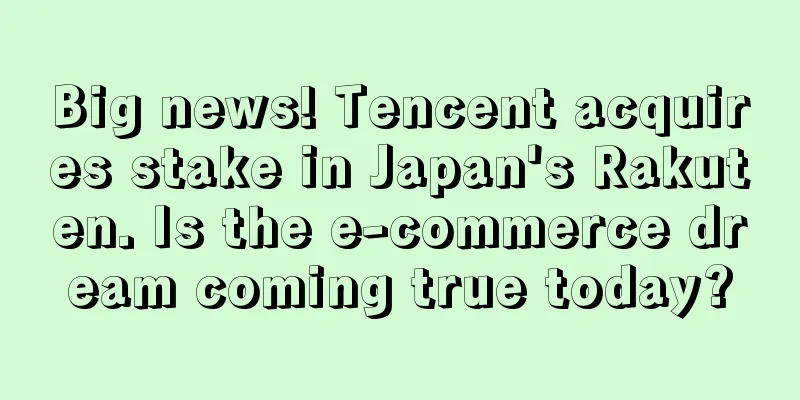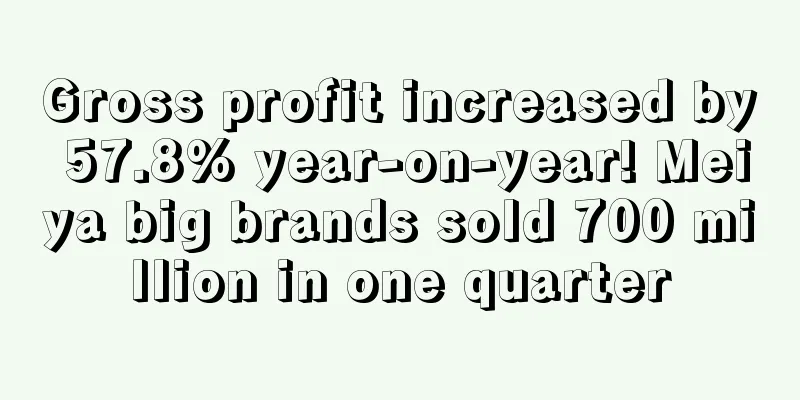Big news! Tencent acquires stake in Japan's Rakuten. Is the e-commerce dream coming true today?

|
In 2020, the e-commerce industry suddenly became hot. Especially when China controlled the epidemic earlier than other countries and resumed production, cross-border e-commerce became particularly hot, and many powerful companies were eyeing this piece of fat.
Recently, Tencent Group issued an announcement, announcing its investment in Japan's Rakuten, seeking strategic cooperation in the fields of digital entertainment and e-commerce.
As soon as the news came out, many netizens expressed their anger and concern: "We have to be cautious in this cooperation. Doesn't Lotte have a relationship with the THAAD missile?" Some netizens also ridiculed Tencent's e-commerce dream.
But in fact, it was South Korea's Lotte that agreed to the deployment of THAAD , and this time Tencent invested in Japan's Rukuten, which has nothing to do with South Korea's Lotte.
This "Lotte" is not that "Lotte", Japan's Lotte is really wronged
Rukuten is a B2B and B2C shopping platform under Rakuten Corporation. It is the largest shopping platform in Japan, with a market share of 26.8%, which is higher than Amazon. In other words, in Japan, the largest e-commerce shopping platform is Rakuten, not Amazon.
South Korea's Lotte ( LOTTE) is one of the five largest groups in South Korea, and has developed in the fields of retail, food, tourism, petrochemicals, real estate and finance in nearly 20 countries around the world. The only thing the two have in common is the Chinese translation. Internationally, LOTTE is usually used to refer to South Korea's Lotte, and Rakuten is used to refer to Japan's Lotte.
As early as 2017, Japan's Rakuten once posted a Weibo to clarify that it and South Korea's Rakuten are two completely different companies, and have no relationship except for the same Chinese characters. However, even now, Chinese netizens still cannot distinguish them clearly...
A strong alliance may help Tencent realize its 15-year e-commerce dream
As we all know, Tencent has always had an e-commerce dream in mind, especially since Tencent's social traffic has long been the largest in China, and it would be a bit unreasonable not to cash in. In 2005, Tencent launched the C2C e-commerce platform Paipai.com to compete with Taobao, and later launched QQ Mall and QQ Online Shopping, and acquired Yixun.com and Maimaibao.com.
However, Tencent's self-operated e-commerce business has not been going smoothly, and many industry insiders have laughed at it as having "no talent". In desperation, it chose to change its strategy and invested in e-commerce platforms such as JD.com and Pinduoduo, intending to find another way to penetrate the e-commerce field.
Although investing in e-commerce can also make Tencent taste the sweetness, the attraction of e-commerce is still too great. Later, Tencent relied on the technology of mini programs and its own social traffic to make the e-commerce dream come true:
After three years, the construction of Tencent's "Mini Program Economic Circle" has begun to show results. In 2019, the transaction volume of mini programs exceeded 800 billion. The 2020 "Code Economic Impact Report" shows that mini programs have become a new online entrance for retail stores, and the overall GMV of industry mini programs has increased by 670% year-on-year.
However, this is only in China. The popularity of cross-border e-commerce in 2020 has also made Tencent turn its attention overseas. According to Japanese media reports, Rakuten plans to issue 211,656,500 shares at a price of 1,145 yen (US$10.5) per share, with a total financing amount of US$2.2 billion.
Japan Post is expected to acquire 131,004,000 shares, accounting for 8.3%, Tencent is expected to acquire 57,382,900 shares, accounting for 3.6%, and US retailer Walmart is expected to acquire 14,536,000 shares, accounting for 0.9%. In the future, Rakuten is expected to have in-depth cooperation with Tencent in cross-border e-commerce imports of Japanese goods (WeChat mini-programs), in-depth cooperation in the game field (IP and authorization, going overseas and introduction), finance and other potential directions.
Tencent's digital entertainment and mini-program technologies can indeed provide considerable assistance to Rakuten Japan. On the other hand, Rakuten Japan also has a very strong appeal and market share in Japan, attaches great importance to product quality, and has attracted a large number of "die-hard fans."
Japan's Rakuten e-commerce has relatively strict requirements for merchants to enter the market. Generally, domestic companies that do not have Japanese companies can choose to enter overseas directly or through operator agents. Its strong categories are fashion clothing , beauty and cosmetics, furniture and home furnishings, daily necessities, etc. 3C electronics have not yet occupied most of the market and have a large room for development. E-commerce platform Rakuten Tencent |
Recommend
Singapore's e-commerce sales are expected to exceed US$14 billion by 2027
Singapore's e-commerce sales are expected to ...
Shopify welcomes its first grocery dropshipping platform, allowing independent website sellers to easily enter the grocery market!
According to foreign media reports, online grocer...
The scale of e-commerce exceeds 400 billion, Temu and Alibaba have tapped into new markets!
At the end of November 2024, it was announced tha...
Shopee is entering Poland! Is it starting to expand into Europe?
According to Reuters , sources at Shopee said tha...
AliExpress orders surged by 60%, with a number of merchants rushing to grab the Spring Festival orders
In the first week of work, cross-border merchants...
What is COSCO SHIPPING Development Co., Ltd.? COSCO SHIPPING Development Co., Ltd. Review, Features
COSCO SHIPPING Development Co., Ltd. is a company ...
What is Wuxi Yingda Juli Technology Co., Ltd.? Wuxi Yingda Juli Technology Co., Ltd. Review, Features
Wuxi Yingda Juli Technology Co., Ltd. is headqua...
What is pencils? pencils Review, Features
Pencils was registered in 1996 and is a cedar penc...
Amazon launches the “delete review” feature. Is it for sellers or for itself?
Recently, Amazon announced that brands and seller...
Steady growth! Christmas decorations market will reach 7.53 billion US dollars
According to a recent study, the global Christmas...
What is Stryze Group? Stryze Group Review, Features
Stryze Group is a leading direct-to-consumer (D2C)...
What is Wanlicheng? Wanlicheng Review, Features
Wanlicheng (Shenzhen Wanlicheng Import and Export...
Shopee updates four major policies, and there are major adjustments to the site fees in Malaysia and Indonesia!
The import taxes and service rates for Malaysia a...
Poshmark continues to perform well despite 43% year-on-year growth in GMV in the first quarter
Financial report data shows that in the first qua...
Total transaction volume reached 126 trillion won! South Korea's O2O services grew rapidly during the epidemic
South Korea's online-to-offline ( O2O) servic...









